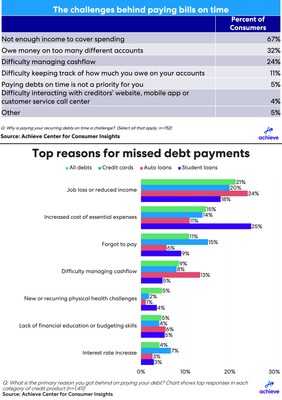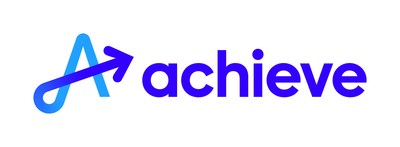69% of consumers failed to reduce their debt last quarter, Achieve survey finds
Most consumer debt loads grew or remained level over the past three months as more households turn to credit cards to make ends meet
SAN MATEO, Calif., Oct. 31, 2025 /PRNewswire/ -- Over one-in-four consumers (27%) took on more debt during the past three months, according to the results of the latest survey by Achieve, the leader in digital personal finance. The current metric is up from 22% in the previous edition of the survey and a worrying sign of the continued financial strain facing many American households.
Overall, 69% of consumers saw their debt increase or remain unchanged over the past three months. The fourth quarter 2025 survey found 31% of consumers lowered their total debt over the past three months, down from 34% in the third quarter 2025 edition of Achieve's survey. Meanwhile, 42% said their total debt didn't change, down from 43% last quarter. These shifts correspond with an overall trend of deteriorating financial conditions for many American households:
- 54% of consumers carry credit card balances to cover the cost of essential expenses, including 28% of respondents who have carried this debt for six months or longer.
- 58% rate their current financial situation as either "Poor" or "Fair," while 31% gave themselves a "Good" rating and 11% said their financial situation is "Excellent."
- 33% report not being able to pay all of their bills on time each month.
The September 2025 survey was conducted by Achieve's think tank, the Achieve Center for Consumer Insights, and complements the Federal Reserve Bank of New York's upcoming Quarterly Report on Household Debt and Credit by providing qualitative insights into consumer borrowing and debt.
"Achieve's latest survey demonstrates the elevated financial strain many American households are currently facing," said Achieve Co-Founder and Co-CEO Brad Stroh. "Many Americans were facing financial pressures even before the government shutdown put additional stress on a large segment of the economy. The volatile combination of consumer debt, inflation hangover on prices, elevated interest rates and the shutdown could leave a lasting economic impact, particularly for those more at-risk American households struggling to make ends meet."
Consumers also reported needing more time to pay off their existing short-term debt from credit cards, buy now, pay later loans, personal loans and other unsecured accounts. The survey found:
- 41% of respondents said it will take them more than a year to pay off their debt (up from 37% last quarter).
- 16% of those surveyed expect it will take six months to one year to pay off debts (down from 18%).
- 42% believe they can pay debt off in six months or less (down from 45%).
Wages come up short to keep up with multiple accounts
Achieve's survey found 38% of consumers said it's "Very Difficult" or "Difficult" to pay all of their bills on time, up from 35% last quarter. Among these consumers, 67% said their income isn't enough to cover their spending, while 32% said they owe money on too many accounts to keep up.
The challenges behind paying bills on time | |
Percent of Consumers | |
Not enough income to cover spending | 67 % |
Owe money on too many different accounts | 32 % |
Difficulty managing cashflow | 24 % |
Difficulty keeping track of how much you owe on your accounts | 11 % |
Paying debts on time is not a priority for you | 5 % |
Difficulty interacting with creditors' website, mobile app or customer service call center | 4 % |
Other | 5 % |
Q: Why is paying your recurring debts on time a challenge? (Select all that apply, n=752) Source: Achieve Center for Consumer Insights | |
When consumers do miss debt payments, unexpected job losses and income reductions continue to be the leading cause of missed payments across most categories of debt, followed by higher costs and financial literacy challenges.
Top reasons for missed debt payments | ||||
Reasons for missing payment | All debts | Credit cards | Auto loans | Student loans |
Job loss or reduced income | 21 % | 20 % | 24 % | 18 % |
Increased cost of essential expenses | 15 % | 14 % | 11 % | 25 % |
Forgot to pay | 11 % | 15 % | 6 % | 9 % |
Difficulty managing cashflow | 9 % | 8 % | 13 % | 5 % |
Lack of financial education or budgeting skills | 5 % | 4 % | 6 % | 5 % |
New or recurring physical health challenges | 5 % | 2 % | 1 % | 4 % |
Interest rate increase | 4 % | 7 % | 3 % | 3 % |
Q: What is the primary reason you got behind on paying your debt? Chart shows top responses in each category of credit product (n=1,411) Source: Achieve Center for Consumer Insights | ||||
Methodology
The data and findings presented are based on an Achieve survey conducted in September 2025 consisting of 2,000 U.S. consumers ages 18 and older with an active account for one or more of the following categories of consumer debt: auto loan; major credit card with a minimum outstanding balance of $100; first-lien mortgage; home equity line of credit (HELOC); student loan; and other (unsecured personal loan, store-branded credit card, buy now, pay later loan, or closed-end home equity loan). The sample was augmented to include a statistically significant subset of credit card, auto loan and student loan borrowers who have been 30 days or more past due at least once in the past six months.
About the Achieve Center for Consumer Insights
The Achieve Center for Consumer Insights is a think tank that leverages Achieve's team of digital personal finance experts to provide a view into the state of consumer finances. In addition to sharing insights gleaned from Achieve's proprietary data and analytics, the Achieve Center for Consumer Insights publishes in-depth research, bespoke data and thoughtful commentary in support of Achieve's mission of helping everyday people get on the path to a better financial future.
About Achieve
Achieve, THE digital personal finance company, helps everyday people get on, and stay on, the path to a better financial future. Achieve pairs proprietary data and analytics with personalized support to offer personal loans, home equity loans, debt relief and debt consolidation, along with financial tips and education and free mobile apps: Achieve MoLO® (Money Left Over) and Achieve GOOD™ (Get Out Of Debt). Achieve has 2,200 dedicated teammates across the country, with hubs in Arizona, California, Florida and Texas. Achieve is frequently recognized as a Best Place to Work.
Achieve refers to the global organization and may denote one or more affiliates of Achieve Company, including Achieve.com, Equal Housing Opportunity (NMLS ID #138464); Achieve Home Loans, Equal Housing Opportunity (NMLS ID #1810501); Achieve Personal Loans (NMLS ID #227977); Achieve Debt Relief (NMLS ID # 1248929); and Freedom Financial Asset Management (CRD #170229).
Contacts
Austin Kilgore
Director
Corporate Communications
akilgore@achieve.com
214-908-5097
Elina Tarkazikis
Manager
Corporate Communications
etarkazikis@achieve.com
![]() View original content to download multimedia:https://www.prnewswire.com/news-releases/69-of-consumers-failed-to-reduce-their-debt-last-quarter-achieve-survey-finds-302600694.html
View original content to download multimedia:https://www.prnewswire.com/news-releases/69-of-consumers-failed-to-reduce-their-debt-last-quarter-achieve-survey-finds-302600694.html
SOURCE Achieve



